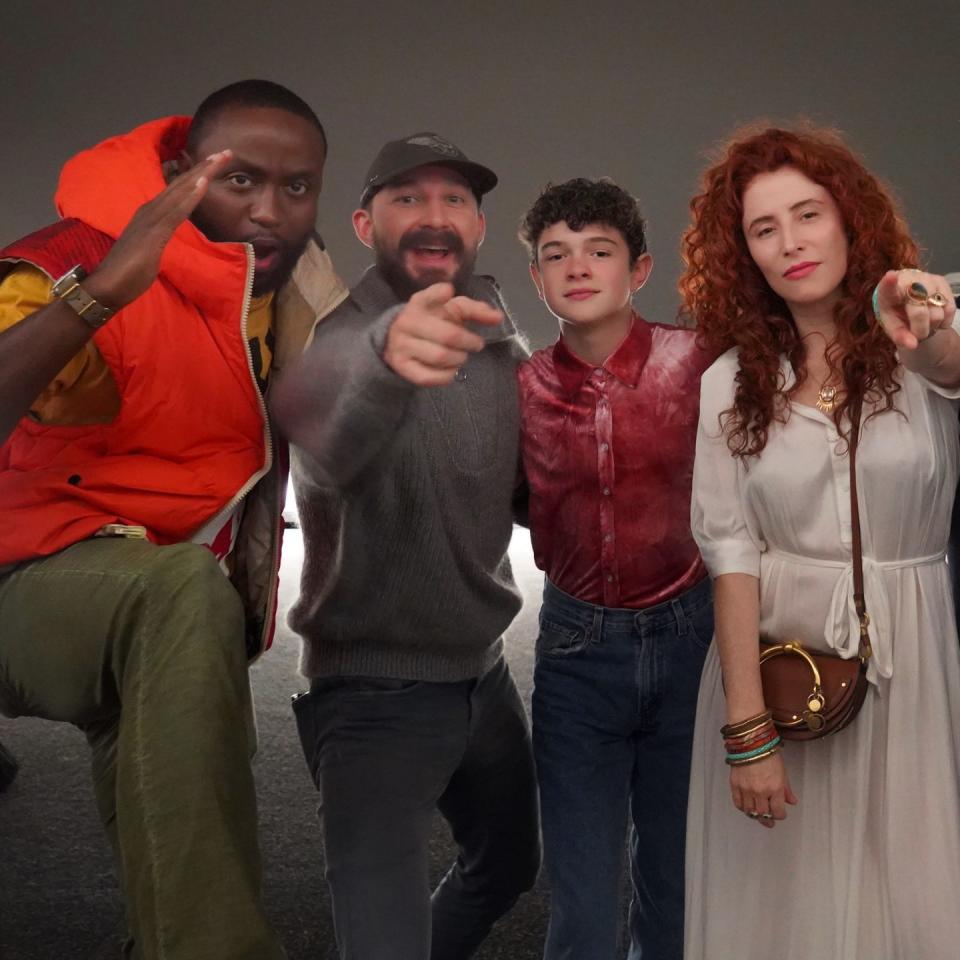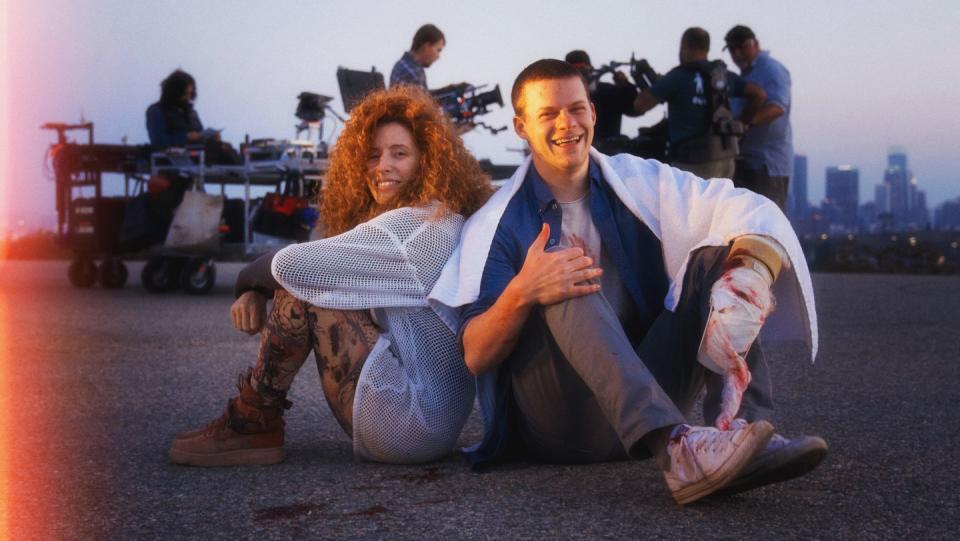How 'Honey Boy' Director Alma Har'el Found Love In Shia LeBeouf's Pain

Trauma has always been fertile ground for art. Creativity is a way to process pain, to find meaning in personal suffering. It’s also, as a byproduct, a good way to get yourself mentioned in Oscar conversations. Which is precisely what has happened for Shia LeBeouf, the Disney Channel heartbreaker turned Transformers star turned tabloid punching bag, whose once bright career has recently dimmed in the wake of a succession of at-best ill-advised, at-worst criminal missteps.
After his most recent stint in jail, LeBeouf underwent a court-ordered course of exposure therapy. It was there that the 33-year-old, who grew up dirt poor and became an actor at 12 as a way to make money for his family, began to work through the trauma that he experienced as a child at the hands of his abusive and alcoholic father, Jeffrey Craig LeBeouf, who served as his full-time guardian while on- and off-set. It was through these sessions that LaBeouf started to write down the memories that he would eventually turn into the script for his new film, Honey Boy.

“[Reading that] was so fucking raw and so full of heart and life and pain and love,” says its director, Alma Har’el. Until now, she was best known for her award-winning music videos and an innovative approach to documentary-making. But Honey Boy – her first feature film, as well as LeBeouf’s first writing credit – should change that. Drawing heavily on LeBeouf's life, it explores the relationship between an alcoholic, abusive father, played by LeBeouf, and his son, played as a child by Noah Jupe, and as an adult by Lucas Hedges. In the film, Hedges's 22-year-old version is a movie star struggling with the ramifications of his traumatic childhood, and the substance abuse issues it precipitated.
LeBeouf had worked with Har’el previously, as executive producer on LoveTrue, her 2016, dramatised documentary about love and faith. He’d first approached after seeing her award-winning, experimental documentary Bombay Beach (2011). She in turn was drawn to his script partly by its emotional power, but also because she recognised the experiences it conveyed; she too had grown up with an alcoholic father.
“Those are the kind of relationships you have with parents like that – who are addicts or are themselves hurt and running away,” she says. “It hit me so hard because after spending my whole life trying to untangle the pain and love, pity and caretaking, I felt like I understood it so well; he could put down on the page things that I have never been able to write, and I really wanted to help tell his story and also how little people know about what he went through.”
To do that, Har’el’s film keeps a narrow focus, zeroing in on a period in LeBeouf’s life that took place in and around a hotel room that he lived in with his father when his acting career was first blooming. “I guess I’m kind of a proof of the power of art to draw people together who have similar wounds and a story to tell,” says Har’el. “And that can be also healing to others.”
Honey Boy has won critical acclaim and Oscar buzz for its lynchpin, LeBeouf, for both his performance and his script. A few days after the film’s US premiere, we spoke with Har’el about her experience working with LeBeouf, the challenges of shooting such traumatic material, and why every day on set was “like breathing in pain and breathing out love.”

Honey Boy is your first scripted film. Did your directing technique change for that compared to how you approach your feature documentaries?
I didn’t go to film school, so I’m unorthodox in every way that I work. Documentaries inform everything I do but you could also say that video art, dance and music videos informed my documentaries. So, what’s a genre to begin with? On Honey Boy, I only storyboarded scenes that involved visual effects. I didn’t want to storyboard dramatic scenes because I always want to have life in the room. Even though we did rehearsals for two months, a lot of that gets thrown out the window and we end up improvising and seeing what feels right on the set.
What did that look like?
We did a lot of takes on Honey Boy, and a lot of them were very different from each other. And then there were scenes that were so extremely painful to do that we couldn’t do more than one or two takes. Everyone would be crying afterwards, and I just knew we had it. It was of course the case with one or two scenes with Shia, but it wasn’t just him. Lucas Hedges did all of the therapy scenes in one day and I remember him screaming, "Make it stop", in pain. It was a combination of rehearsals and improv and also parts that were just completely therapeutic and more done as an act of these psycho-magical moments, whose rawness had to be embraced instead of going, "OK, let’s do this ten more times".
Was that difficult?
I think it was very hard for some people on set to trust that somebody who is a first-time filmmaker knows what they’re doing and that it’s not a mistake to shoot nine different takes that don’t always cut with each other. It’s hard being a first-time woman filmmaker as it is, and it’s even harder when you’re not working like anyone else. But my job is to trust my own instincts and know when things have to be pushed and when things have to be accepted for what they are. Every day on this set we were breathing in pain and breathing out love.
LaBeouf was sending you such intimate writing as he explored his own trauma. Why you?
Almost no one was talking to him at the time; everybody kind of gave up on him. I was one of the only people that was checking in on him and worried about him. And he was informing me [about] what he was going through. And whether it was subconscious or not, though that was not something that he directly asked me to do, I think he wanted me [to direct it]. It was so striking because I knew that if he was to play his father, it would be a continuation of everything we’d started to do on LoveTrue.

We can’t cure toxic masculinity, but are you trying to help people understand it better?
It is really important to say that it’s the journey of a lifetime to deal with childhood trauma. There are a few separate issues in this film that get wrapped together. Shia was diagnosed with PTSD, which can cause damaging aggressive behaviour towards others and hyper-vigilant states. I have experienced them on set, too, and had to learn how to diffuse them. He was always extremely protective towards Noah, but often saw me as a threat.
Over the years we all saw how his PTSD has affected some of his volatile interactions with people but didn’t know why, and only blamed it on his alcoholism. A few years ago, he played a soldier who suffered from PTSD on the film Man Down, and Lucas and me actually watched it a lot. It is a time of reckoning and we are finally understanding the structures of power that have allowed for toxic masculinity or sexual assault to prevail in many different industries. I think people in general are trying to understand where toxic masculinity is coming from and what it means. One thing I know is that little boys are not born toxic. So, for me as an artist, it’s important to develop more nuance in our culture between accountability and compassion. Is there a way to be accountable but also work on healing those who need help?
Honey Boy has a UK release date of 6 December
You Might Also Like

